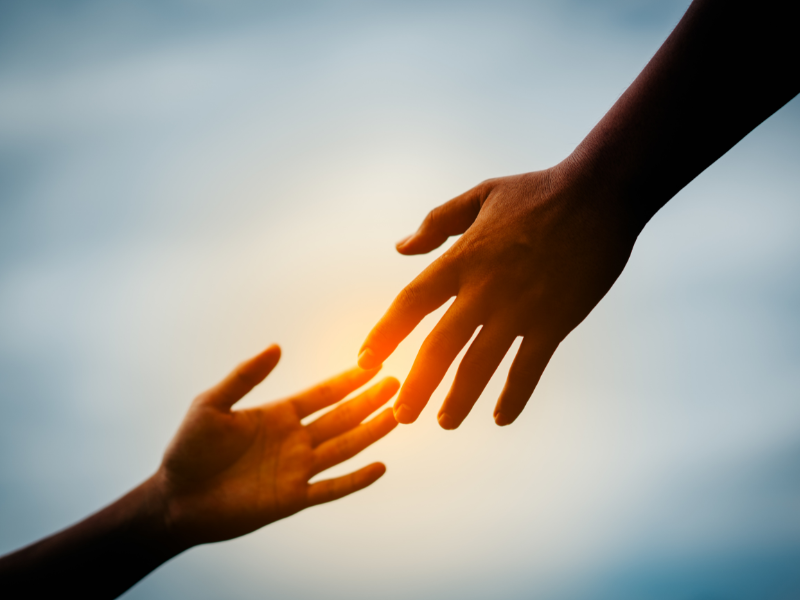July 12, 2023
Helen Keller famously said, “Alone we can do so little, together we can do so much.”
When thinking about an individual’s success and how we work to support those in need, the power of community is a key ingredient in anyone’s ability to thrive. Through our work at Jewish Family & Children’s Service (JFCS), we know that for someone to be successful they must want to help themselves. This idea – the concept of self-determination – in no way conflicts with the role of community in our clients’ lives. In fact, the importance of community is only elevated when our clients work to address their own needs and overcome their own challenges – regardless of what they may be.
As social creatures, people rely on community to feel connected to others and to be accepted for who we are. Family and friends are the natural building blocks of any community. During challenging times, having a community to depend upon becomes essential to our own well-being. The impact that even one single person can have on a community is significant. We have all heard the saying, “you are only as happy as your least happy child,” but in truth this extends beyond parental connection to folks of every generation whom you care about deeply.
Having survived a global pandemic, we surely all remember the feelings of loneliness and isolation we were confronted with when our community was torn away from us at a moment’s notice. The pandemic was especially hard on those who were already isolated and lacked social interaction. Seniors, adults with disabilities, those who were financially vulnerable or food-insecure, and those living alone with mental health challenges were disproportionately affected.
Connection to community and social infrastructure have direct correlations to physical health and, of course, their mental well-being. According to Dr. Sarah Pressman of the University of California, Irvine, loneliness can reduce one’s lifespan by 70% as compared to other physical issues such as obesity (20%) and smoking (50%). Loneliness can even affect our ability to manage stress, increase our energy levels, and can negatively impact our sleep and concentration. Additionally, loneliness and isolation put us at higher risk for substance misuse.
So, what can you do if you are experiencing social isolation? Luckily, there are concrete steps you can take. First, acknowledge your feelings – a critical first step in dealing with your loneliness. Focus on the feelings and needs of others, which can offer relief from the weight of your own struggles. Cultivate an attitude of gratitude by accentuating the positive things in your life. Reach out to others: call a longtime friend on the phone to ask how they’re doing or check in on an elderly neighbor who lives alone.
For some, the actions above may not be enough. If you or someone you care about are feeling overwhelmed by loneliness, isolation, or any mental health challenge, please know that you don’t have to go it alone. I urge you to reach out for professional help. Join a support group, seek individual or family counseling, or learn about respite care options that may be available to you. JFCS exists to help our South Jersey community members through exactly these types of challenges.
Throughout each of our core services, JFCS assesses our clients and their interaction with the community around them. Evaluating our clients’ level of isolation and available support allows us to understand and address each person’s holistic needs. From support groups addressing caregiving, grief and loss, or domestic violence, to social and recreational programs for adults with intellectual disabilities, to Friendly Visitor volunteers who check in on isolated seniors, to our monthly Café Europa and Hope & Healing programs for Holocaust Survivors…our staff and volunteers are keenly aware of the power of connection.
Among many JFCS offerings, our virtual Caregivers Support Group is a good – and immediately available – option for those who are currently providing care for a family member or other loved one. Over the course of six monthly sessions, the group offers a nonjudgmental forum for participants to discuss sensitive topics, develop better coping skills, and learn more about local supportive resources. As one group member recently told me, “We offer each other encouragement and friendship and learn about techniques to improve our lives – whether it’s how to get through the frustrations of the day or how to reclaim time for ourselves. But mostly, the group is about hope—a commodity that is in short supply for too many of us.” A new session of the Caregivers Support Group will begin next Wednesday, July 19 at 2:00pm on Zoom. To learn more or to register, please contact the group facilitator, Reva Farenback-Brateman, at (856) 424-1333 or rfbrateman@jfedsnj.org.
However, the Caregivers Support Group is just one offering and one option for those in our community. JFCS offers a host of support groups, counseling, volunteer opportunities, and other ways of connecting with the broader community. I encourage every community member to find out how JFCS can help you thrive and if you are interested, how you can help others. I know that together we can truly make a difference. To learn about everything we have to offer, visit us at https://jfcssnj.org.

